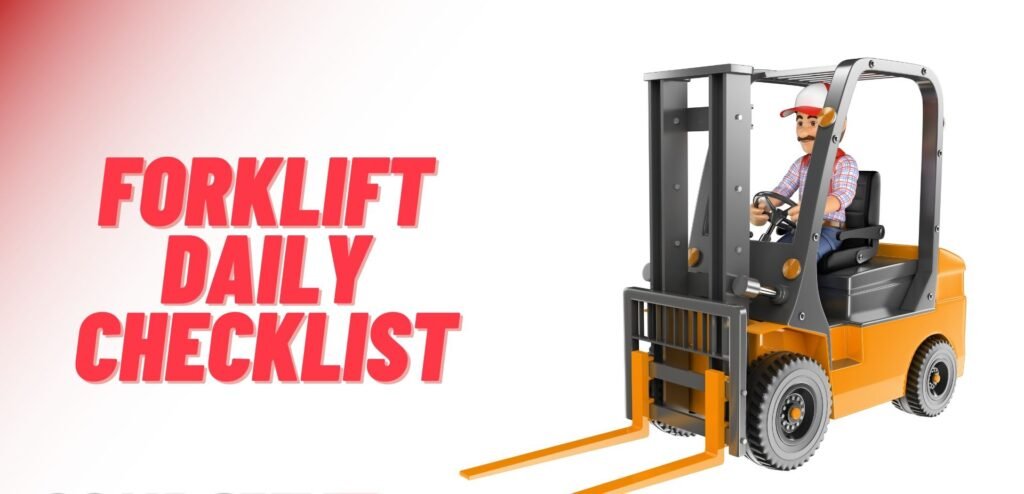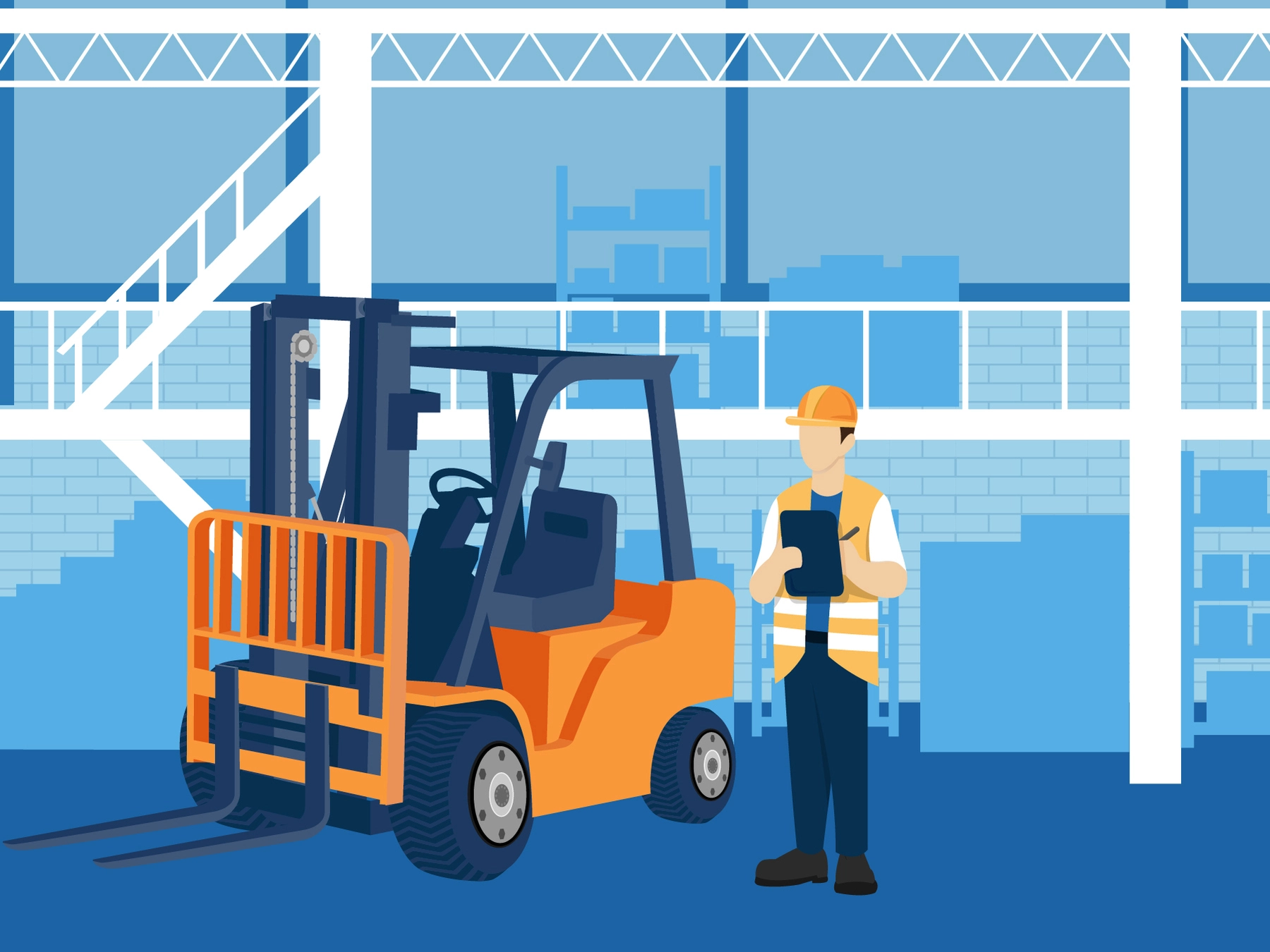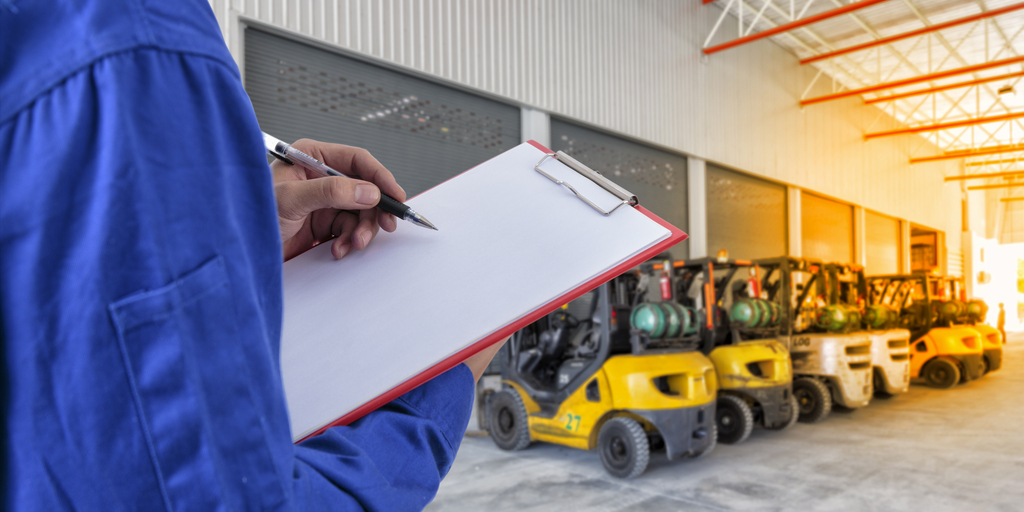Daily forklift inspections are crucial to maintaining a safe and efficient work environment. At Upright Forklift Repair in Houston, TX, and Humble, we emphasize the importance of these inspections to prevent accidents and equipment damage. By adhering to these guidelines, you can ensure the longevity of your equipment and the safety of your operators.

Why Daily Forklift Inspections are Crucial?
Conducting daily forklift inspections is essential for the safety of operators and workers. Forklift trucks are powerful machines, and any malfunction can lead to severe injuries. Regular inspections help identify potential hazards and mechanical issues, ensuring that the forklift operates safely. Moreover, routine checks prevent equipment damage by catching problems early, reducing the risk of costly repairs and downtime.
Step-by-Step Daily Forklift Inspection Checklist
Pre-Operational Inspection
Visual Inspection of the Forklift
Start with a thorough visual inspection of the forklift. Look for visible damage, leaks, and signs of excessive wear on the forklift truck. Pay close attention to the operator compartment, tires, and hydraulic hoses.
Checking Fluid Levels
Ensure all fluid levels, including hydraulic fluid and oil, are at their recommended levels. Proper fluid levels are vital for the safe operation of forklifts, preventing overheating and ensuring hydraulic systems function correctly.
Operational Inspection
Testing the Steering Wheel and Parking Brake
Test the steering wheel for responsiveness and the parking brake for secure engagement. These components are critical for maneuvering and safely parking the forklift.
Examining the Lift Mechanism and Hydraulic Controls
Inspect the lift mechanism and hydraulic controls to ensure they operate smoothly. Any irregularities in these systems can affect the forklift’s performance and safety.
Checking the Forklift Safety Devices
Verify that all safety devices, such as limit switches and indicator lights, are functioning correctly. These devices are essential for preventing accidents and ensuring operational safety.
Visual Inspection of Forklift Components
Inspecting the components of your forklift truck is a key part of daily checks. Start with the tires and wheels, looking for proper inflation and any signs of damage or excessive wear. Examine the forks and attachments for any integrity issues or improper connections. Additionally, ensure the operator compartment is clean and the seat belt is functional, as these are crucial for the operator’s safety.
By following these steps and conducting thorough daily inspections, you can maintain the reliability and safety of your forklift trucks, ensuring a safer work environment for all employees. For professional assistance and reliable forklift repair services in Houston, TX, and Humble, contact Upright Forklift Repair. Our expert team is dedicated to keeping your forklifts in top condition, enhancing both safety and efficiency in your operations.
Checking Fluid Levels and Hydraulic Systems
Maintaining proper fluid levels in your forklift truck is essential for safe and efficient operation. Regularly check the hydraulic fluid and oil levels to ensure they meet the manufacturer’s recommendations. Low fluid levels can lead to overheating and reduce the efficiency of the hydraulic system.
Inspect hydraulic hoses and connections for any signs of leaks, cracks, or wear. Ensuring these components are in good condition prevents hydraulic failure and maintains the smooth operation of your forklift.
Testing Mechanical and Electrical Safety Devices
For acomprehensive forklift inspection, test both mechanical and electrical safety devices. Start with the seat locks and limit switches to ensure they function correctly, providing necessary safety measures during operation. Check all indicator lights and dashboard controls for proper functionality. These safety devices, including electrical safety devices, are crucial for alerting the operator to potential issues and maintaining operational safety.
Operational Checks: Steering, Brakes, and Controls
Operational checks are vital to ensure your forklift operates smoothly and safely. Test the steering wheel for responsiveness and the foot brake pedal for proper engagement. These controls are essential for maneuvering the forklift truck and ensuring safe stopping.
Additionally, test the forward and reverse gears to confirm they engage smoothly and respond correctly. These operational checks are fundamental to daily forklift inspections, ensuring your equipment is ready for use.
Ensuring Load Capacity and Stability
Ensuring the load capacity and stability of your forklift is critical for safe operation. Always check the capacity load plate to verify the forklift is not overloaded. Operating a forklift beyond its capacity can lead to tipping and accidents.
Additionally, assess the stability of the forklift with different loads to ensure it remains balanced and secure during operation. By adhering to these guidelines, you can operate your forklift safely and efficiently, preventing accidents and equipment damage.
Incorporating these steps into your daily forklift inspection routine will help maintain the reliability and safety of your forklift trucks. For expert maintenance and repair services in Houston, TX, and Humble, trust Upright Forklift Repair to keep your equipment in optimal condition.
Safety Precautions for Gas Operated and Internal Combustion Forklifts
For gas-operated and internal combustion forklifts, regular checks of the exhaust system and air filter are crucial. Ensure the exhaust system is free from blockages and leaks to prevent harmful emissions. Inspect the air filter for cleanliness and replace it if necessary. Also, regularly check fuel and oil levels to maintain optimal engine performance and prevent overheating.

Using Personal Protective Equipment (PPE) During Inspections
The importance of personal protective equipment (PPE) during forklift inspections cannot be overstated. PPE protects you from potential hazards encountered during inspections. Essential types of PPE for forklift inspections include safety glasses, gloves, and steel-toed boots. Always wear the appropriate PPE to ensure your safety while performing daily checks.
Reporting and Addressing Issues Immediately
Any issues identified during the inspection should be reported to supervisors immediately. Promptly addressing and recording these issues ensures they are resolved before the forklift is used again, maintaining safety and preventing further damage. Keeping detailed records of inspections and maintenance needs also helps track the forklift’s condition over time.
Importance of Pre-Operation Inspection for Forklift Safety
Pre-operation inspections are critical for ensuring forklift safety. These inspections help identify and mitigate potential hazards before they can cause accidents or equipment failures. Begin by examining the forklift’s capacity load plate to confirm the load weight does not exceed the recommended limits. Overloading can lead to tipping and serious accidents.

Forklift operators should also inspect the vehicle’s fluid levels, including hydraulic fluid and oil. Maintaining proper fluid levels prevents overheating and ensures the forklift operates efficiently. Additionally, check for any leaks in the hydraulic system or fuel system, especially in gas operated forklifts and liquid propane forklifts.
Inspecting the mechanical and electrical components is equally important. Ensure that all safety devices, such as limit switches and seat locks, are operational. Verify the condition of the brakes, steering wheel, and other controls. By performing a thorough pre-operation inspection, forklift operators can enhance workplace safety and reduce the risk of equipment failure.
Managing Load Hazards with Powered Industrial Trucks
Managing load hazards is a crucial aspect of operating powered industrial trucks, such as forklifts. Forklift operators must be vigilant about the types of loads they handle and ensure they are within the forklift’s capacity load plate limits. Exceeding these limits can cause instability and increase the risk of tipping.
Operators should also be trained to recognize and address load hazards. This includes checking the load’s stability, securing it properly, and ensuring it does not obstruct the operator’s view. Using appropriate forklift attachments can help manage uneven or oversized loads, enhancing stability and safety.
Additionally, operators must be aware of environmental hazards, particularly when using gas operated forklifts and liquid propane forklifts. Ensure the work area is well-ventilated to prevent the buildup of harmful fumes. Regularly inspect the forklift for any signs of wear or damage that could affect its ability to handle loads safely. By effectively managing load hazards, operators can maintain a safer working environment and prevent accidents.
Call to Action
Regular daily forklift inspections are essential for maintaining safety and efficiency in your operations. By following these guidelines, you can prevent accidents and extend the lifespan of your equipment. For expert forklift repair and maintenance services in Houston, TX, and Humble, contact Upright Forklift Repair.
Our team is dedicated to keeping your forklifts in top condition, ensuring a safer and more productive work environment. Reach out to us today to schedule an inspection or service appointment.
